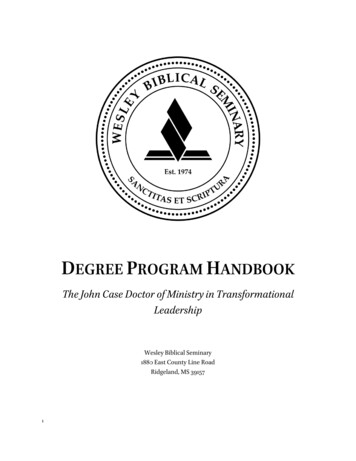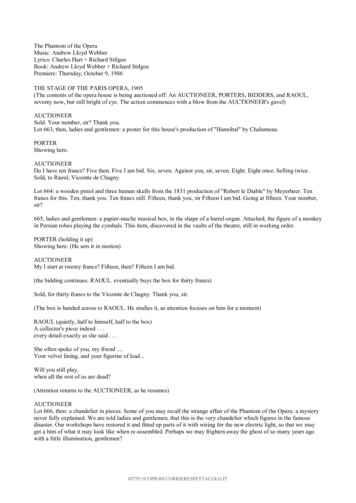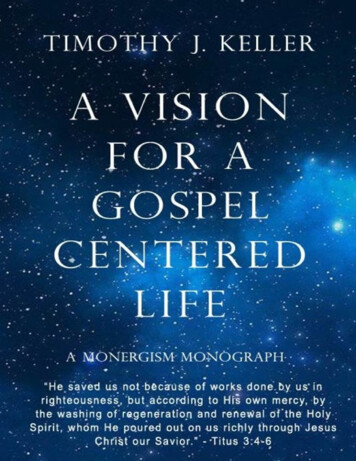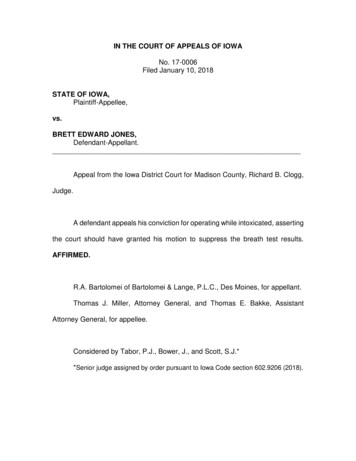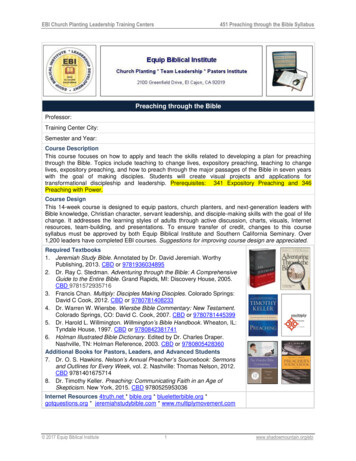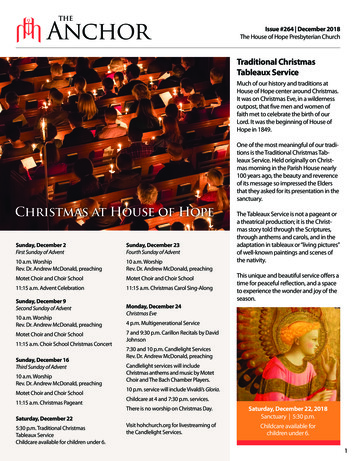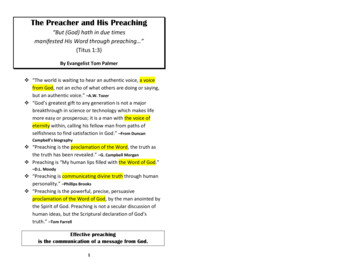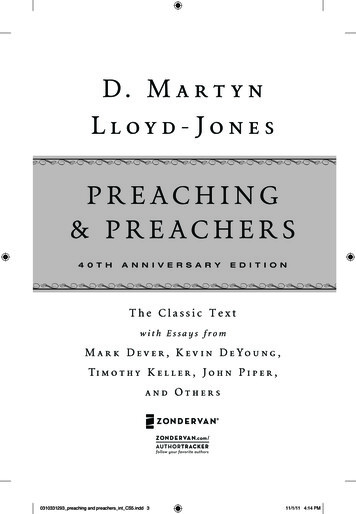
Transcription
D. M a rt y nLloyd-JonesPREACHING& PREACHERS4 0 T HA N N I V E R S A R YE D I T I O NThe Classic Textwith Essays fromM a r k D e v e r , K e v i n D e Yo u n g ,Ti m o t h y K e l l e r , J o h n P i p e r ,and Others0310331293 preaching and preachers int CS5.indd 311/1/11 4:14 PM
ZONDERVANPreaching and PreachersCopyright 2011 by D. Martyn Lloyd-JonesThis title is also available as a Zondervan ebook.Visit www.zondervan.com/ebooks.Requests for information should be addressed to:Zondervan, Grand Rapids, Michigan 49530Library of Congress Cataloging-in-Publication DataLloyd-Jones, David Martyn.Preaching and preachers / D. Martyn Lloyd-Jones; edited by Kevin de Young.p. cm.Includes bibliographical references.ISBN 0-310-33129-3 (hardcover)1. Preaching. I. De Young, Kevin. II. Title.BV4211.3.L58 2011251 — dc232011037204Most Scripture quotations in this book are taken from the King James Version, thougha variety of other translations may be consulted.Any Internet addresses (websites, blogs, etc.) and telephone numbers in this book areoffered as a resource. They are not intended in any way to be or imply an endorsementby Zondervan, nor does Zondervan vouch for the content of these sites and numbersfor the life of this book.All rights reserved. No part of this publication may be reproduced, stored in a retrievalsystem, or transmitted in any form or by any means — electronic, mechanical, photocopy, recording, or any other — except for brief quotations in printed reviews, withoutthe prior permission of the publisher.Cover design: Rob MonacelliInterior design: Matthew Van ZomerenPrinted in the United States of America11 12 13 14 15 16 17 18 /DCI/ 20 19 18 17 16 15 14 13 12 11 10 9 8 7 6 5 4 3 2 10310331293 preaching and preachers int CS5.indd 412/5/11 9:56 AM
CONTENTSNote from the Editor . . . . . . . . . . . . . . . . . . . . . . . . . . . . . . . . . . . . . . . . . 9Foreword . . . . . . . . . . . . . . . . . . . . . . . . . . . . . . . . . . . . . . . . . . . . . . 11Preface . . . . . . . . . . . . . . . . . . . . . . . . . . . . . . . . . . . . . . . . . . . . . . . . 131 THE PRIMACY OF PREACHING . . . . . . . . . . . . . . . . . 17Some Things to Look For and Wrestle Withby Ligon Duncan . . . . . . . . . . . . . . . . . . . . . . . . . . . . . . . . . . . 332 NO SUBSTITUTE . . . . . . . . . . . . . . . . . . . . . . . . . . . . . . . . 373 THE SERMON AND THE PREACHING . . . . . . . . . . 564 THE FORM OF THE SERMON . . . . . . . . . . . . . . . . . . . 75A “Tract for the Times”by Tim Keller . . . . . . . . . . . . . . . . . . . . . . . . . . . . . . . . . . . . . . 925 THE ACT OF PREACHING . . . . . . . . . . . . . . . . . . . . . . . 956 THE PREACHER . . . . . . . . . . . . . . . . . . . . . . . . . . . . . . . 1137 THE CONGREGATION . . . . . . . . . . . . . . . . . . . . . . . . . 133Martyn Lloyd-Jones: The Preacherby John Piper . . . . . . . . . . . . . . . . . . . . . . . . . . . . . . . . . . . . . . 1538 THE CHARACTER OF THE MESSAGE . . . . . . . . . . 1560310331293 preaching and preachers int CS5.indd 711/1/11 4:14 PM
9 THE PREPARATION OF THE PREACHER . . . . . . 177Preaching for Brand New and Tired Old Preachersby Kevin DeYoung . . . . . . . . . . . . . . . . . . . . . . . . . . . . . . . . . 19610 THE PREPARATION OF THE SERMON . . . . . . . . . 19911 THE SHAPE OF THE SERMON . . . . . . . . . . . . . . . . . . 21812 ILLUSTRATIONS, ELOQUENCE, HUMOUR . . . . . 236What I’ve Learned about Preaching from Martyn Lloyd-Jonesby Mark Dever . . . . . . . . . . . . . . . . . . . . . . . . . . . . . . . . . . . . 25513 WHAT TO AVOID . . . . . . . . . . . . . . . . . . . . . . . . . . . . . . 26014 CALLING FOR DECISIONS . . . . . . . . . . . . . . . . . . . . . .28015 THE PITFALLS AND THE ROMANCE . . . . . . . . . . . 298D. Martyn Lloyd-Jones: An Uncommon Zealby Bryan Chapell. . . . . . . . . . . . . . . . . . . . . . . . . . . . . . . . . . . 31716 ‘DEMONSTRATION OF THE SPIRITAND OF THE POWER’ . . . . . . . . . . . . . . . . . . . . . . . . . . 321The MLJ Trust . . . . . . . . . . . . . . . . . . . . . . . . . . . . . . . . . . . . . . . . . . . 343Notes . . . . . . . . . . . . . . . . . . . . . . . . . . . . . . . . . . . . . . . . . . . . . . . . . . . 3450310331293 preaching and preachers int CS5.indd 811/1/11 4:14 PM
NOTE FROMTHE EDITORPreaching and Preachers is a classic. That may sound prosaicin a world of hype and spin, but with this book it is actually true. Inthe spring of 1969, Dr. Martyn Lloyd-Jones gave a series of lectures atWestminster Theological Seminary in Philadelphia that explored thenature of preaching and made a stirring defense for the centrality ofpreaching. These lectures were published in March 1972 as Preachingand Preachers. This fortieth anniversary edition is being released both tohonor the legacy of Lloyd-Jones and to introduce a new generation tohis wisdom and passion. When it came to preaching, the Doctor wasunusually gifted, unusually insightful, and unusually opinionated. You’llfind that the message of this book is just as timely and lively today as itwas four decades ago.This new edition contains the original text of the 1972 edition. Thecontent of the original messages has not been altered. But a few otherelements have been added that should make this popular book evenmore accessible. Subheadings have been added to aid in reading, alongwith questions at the close of each chapter for use in group discussionor personal ref lection. In addition, several contemporary preachershave written essays discussing the impact of this book and the influence Lloyd-Jones has had on their own lives. I trust the contributionsfrom Bryan Chapell, Mark Dever, Ligon Duncan, Timothy Keller, JohnPiper, and myself can serve the church by directing a new generation ofpreachers to this deserving classic.I know of no other book on preaching that will motivate you topreach like this one will. Pastors will rediscover the romance of preaching. Christians in general will be better equipped to understand the90310331293 preaching and preachers int CS5.indd 911/1/11 4:14 PM
10 } PREACHING & PREACHERSpreaching task and why it must have pride of place in the church’s ministry. I love this book because I believe God can use it to make betterpreachers and encourage better preaching. There is no more vital task.For as the pulpit goes, so goes the church.Kevin DeYoung0310331293 preaching and preachers int CS5.indd 1011/1/11 4:14 PM
F O R E WO R DIf there ever was a preacher in the twentieth century whose booksneeded no commendation it would be Dr. D. Martyn Lloyd-Jones. Thisapplies most of all to Preaching and Preachers, a volume that is alreadya classic in its field. But I happen to be in a position to pay Dr. LloydJones perhaps the highest tribute of all. I now stand in the pulpit inwhich he preached for thirty years. I also inherited a part of his congregation and following, and a number of his converts. I can speak withauthority on the work he did.One can imagine that I am not infrequently asked: What is it like tofollow in the steps of Dr. Martyn Lloyd-Jones? The answer is that it isthe easiest thing in the world and the hardest thing in the world. I willexplain. Dr. Lloyd-Jones left a congregation that loved the Gospel morethan a good sermon, preaching more than liturgy, and God Himselfmore than a form of godliness. That is a preacher’s dream. It ought alsoto be said that because the Doctor was utterly unique in his generationthere was no temptation whatever to imitate his style. Not only that;the people knew that there would never be another like him, and consequently were graciously sympathetic towards anybody who made noeffort to emulate him. We had in common the same Gospel, a similartheology and a deep conviction regarding the primacy and centrality ofpreaching.On the other hand, no task could be more awesome and dauntingthan facing a congregation that had been used to ‘reformed preaching atits finest’ (to quote Professor Emil Brunner’s evaluation of Dr. LloydJones) at Westminster Chapel. If ever the quotation ‘I’d as soon preachundressed as unprepared’ applied, it does indeed in the pulpit where theDoctor magnificently opened the Scriptures from 1938 to 1968. Weare talking about a genius — a man who might well have become Prime110310331293 preaching and preachers int CS5.indd 1111/1/11 4:14 PM
12 } PREACHING & PREACHERSMinister had he gone into politics. The quality of his mind was suchthat only a fool would try to master his style.And yet the real secret that lay behind Dr. Lloyd-Jones’ successwas that which defies explanation at the natural level. This is why thispresent book emphasises the man more than the art of preaching, andspiritual preparation more than sermon preparation. This is what is soencouraging! For if we are intimidated by the lack of a natural gift wemay be thrilled at the prospect of having spiritual grace, which alonemakes preaching preaching. I can testify that Dr. Lloyd-Jones has donefar more for me spiritually than he has at any other level. For three years,until a few months before he died, we spent two hours together nearlyevery week discussing what I would preach on the following weekend.But those times did more in making me want to be a better man than abetter preacher. And if one reads this book without catching this spiritone has missed the Doctor’s real genius.His book entered into my life in 1963 — a time when my own ministry needed it most. No writer had gripped me as did this man. I knewI had met a friend, even if we would never meet face to face. His legacyis that we all can have him as a friend. He was the greatest preacher Iever heard and the best friend I ever had.R. T. KendallWestminster ChapelLondonMarch 19810310331293 preaching and preachers int CS5.indd 1211/1/11 4:14 PM
P R E FA C EWhen I was asked to deliver a series of lectures to the students ofthe Westminster Theological Seminary on any aspect of the ministryI might like to choose, I decided that I must speak on ‘Preaching andPreachers’. Many times I had been asked to give a lecture, or two orthree lectures, on ‘Expository Preaching’. I always replied that that wasimpossible — that such a subject demanded a whole series of lecturesbecause there was no magical formula that one could pass on to others.I felt very diffident also to tackle such a great theme, and I havealways been amazed at the readiness of certain young ministers to advisetheir brethren on preaching and pastoral matters. ‘Who is sufficient forthese things?’Even now I am reluctant to put these lectures into print. Perhapsthe one justification for doing so is that I speak out of an experience ofsome forty-four years. During that time in addition to preaching regularly in the two churches of which I have been the pastor — eleven anda half years in South Wales, and thirty years at Westminster Chapel,London — I have always travelled a great deal between the Sundays andpreached elsewhere. While in South Wales I generally preached twiceon Tuesdays and Thursdays, and during most of my time in LondonI would be away on Tuesdays and Wednesdays, trying to get home, ifpossible on Wednesday night in order to prepare for the three sermonsI would have to deliver at Westminster Chapel during the week-end.I should have learned something as the result of that; and that is mysole title to attempt this task.Throughout the years I have read many books on preaching. I cannot say that I have learned much from them, but I have enjoyed themgreatly, and have often been entertained by them — as far as I am concerned the more anecdotal they were the better.130310331293 preaching and preachers int CS5.indd 1311/1/11 4:14 PM
14 } PREACHING & PREACHERSI did not consult any of them again while preparing these lectures.I felt that the best plan would be for me to state my attitude and mypractice for what they are worth.I have aimed at being practical, and I have tried to deal with thevarious detailed problems and questions that men have often put to meprivately, and which have also often been discussed in ministers’ meetings. In any case, as appears in many of the lectures, I thoroughly dislikeany theoretical or abstract treatment of this subject.This consideration has also determined the style. I was talking to —in a sense thinking aloud with — ministerial students and some ordainedpreachers, and this book is addressed to preachers and all those interested in preaching. I have therefore not attempted to change the conversational and intimate style; and apart from minor corrections what isnow in print is what I actually said.While preaching I rarely refer to myself; but here I felt that to beimpersonal would be quite wrong. So there is a good deal of the personaland anecdotal element, I trust that this will be found to be helpful byway of illustration of the principles which I have tried to inculcate.Some may object to my dogmatic assertions; but I do not apologisefor them. Every preacher should believe strongly in his own method; andif I cannot persuade all of the rightness of mine, I can at least stimulatethem to think and to consider other possibilities. I can say quite honestlythat I would not cross the road to listen to myself preaching, and thepreachers whom I have enjoyed most have been very different indeed intheir method and style. But my business is not to describe them but tostate what I believe to be right, however imperfectly I have put my ownprecepts into practice. I can only hope that the result will be of somehelp, and especially to young preachers called to this greatest of all tasks,and especially in these sad and evil times. With many others I pray that‘The Lord of the harvest may thrust forth’ many mighty preachers toproclaim ‘the unsearchable riches of Christ’.I would like to thank Professor Clowney and the members of thefaculty of Westminster Seminary, and all the students, for their mostkindly reception, and for the stimulating atmosphere in which I delivered these lectures during six weeks in the spring of 1969.My thanks are due to Mrs. E. Burney for transcribing the taperecordings of these lectures and preparing the typescript, and also, asever, to my wife who has had to endure my preaching throughout the0310331293 preaching and preachers int CS5.indd 1411/1/11 4:14 PM
PREFACE } 15years, and with whom I have constantly discussed the various aspects ofthis enthralling and vital subject.July 1971D. M. Lloyd-Jones0310331293 preaching and preachers int CS5.indd 1511/1/11 4:14 PM
CHAPTER ONETHE PRIMACYOF PREACHINGWhy am i prepared to speak and to lecture on preaching? There area number of reasons. It has been my life’s work. I have been forty-twoyears in the ministry, and the main part of my work has been preaching;not exclusively, but the main part of it has been preaching. In additionit is something that I have been constantly studying. I am conscious ofmy inadequacies and my failures as I have been trying to preach for allthese years; and that has led inevitably to a good deal of study and ofdiscussion and of general interest in the whole matter. But, ultimately,my reason for being very ready to give these lectures is that to me thework of preaching is the highest and the greatest and the most gloriouscalling to which anyone can ever be called. If you want something inaddition to that I would say without any hesitation that the most urgentneed in the Christian Church today is true preaching; and as it is thegreatest and the most urgent need in the Church, it is obviously thegreatest need of the world also.The statement about its being the most urgent need leads to the firstmatter that we must discuss together — Is there any need of preaching?Is there any place for preaching in the modern Church and in the modern world, or has preaching become quite outmoded? The very fact thatone has to pose such a question, and to consider it, is, it seems to me,the most illuminating commentary on the state of the Church at the170310331293 preaching and preachers int CS5.indd 1711/1/11 4:14 PM
18 } PREACHING & PREACHERSpresent time. I feel that that is the chief explanation of the present moreor less parlous condition and ineffectiveness of the Christian Churchin the world today. This whole question of the need of preaching, andthe place of preaching in the ministry of the Church, is in question atthe present time, so we have to start with that. So often when peopleare asked to lecture or to speak on preaching they rush immediately toconsider methods and ways and means and the mechanics. I believe thatis quite wrong. We must start with the presuppositions and with thebackground, and with general principles; for, unless I am very greatlymistaken, the main trouble arises from the fact that people are not clearin their minds as to what preaching really is. So I am going to deal withthe matter in general before I come down to particulars of any type.Here is the great question therefore: Can we justify preaching? Isthere need of preaching at all in the modern world? This, as you know, isa part of a larger question. We are living in an age when not only preaching but the very Church herself is being questioned. You are familiarwith the talk of ‘religionless Christianity’, with the idea that many havethat the Church herself is perhaps the greatest hindrance to the Christian faith, and that if we really want to see people becoming Christians,and the world, being ‘Christianised’, as they put it, we have to get ridof the Church, because the Church has become an obstacle standingbetween people and the truth that is in Christ Jesus.With much of this criticism of the Church one has, of course, toagree. There is so much that is wrong with the Church — traditionalism,formality and lifelessness and so on — and it would be idle and utterlyfoolish to deny this. Often one really has to ask about certain gatherings and communities of people whether they are entitled to the nameChurch at all. The Church so easily can degenerate into an organisation,or even, perhaps, into a social club or something of that kind; so thatit is often necessary to raise the whole question of the Church herself.However, that is not our object in these lectures, and we are not goingto deal with the nature of the Church as such; but, as part of the generalattitude to the Church, this matter of preaching must obviously ariseacutely; and that is the theme with which I have to deal.What is the cause of the present reaction against preaching? Whyhas preaching fallen from the position it once occupied in the life of theChurch and in the esteem of people? You cannot read the history of theChurch, even in a cursory manner, without seeing that preaching has0310331293 preaching and preachers int CS5.indd 1811/1/11 4:14 PM
THE PRIMACY OF PREACHING } 19always occupied a central and a predominating position in the life ofthe Church, particularly in Protestantism. Why then this decline in theplace and power of preaching; and why this questioning of the necessityfor any preaching at all?THE DECLINE ANDFALL OF PREACHINGI would divide my answer to that question under two general headings.First of all there are certain general reasons which account for this, andthen there are certain particular reasons in the Church herself. When Isay ‘general’ I mean certain common ideas current in the world outsidethe Church. Let me illustrate what I mean. When making this point,for instance, in Great Britain I generally refer to it as Baldwinism. Forthose not familiar with that term let me explain what it means. Therewas a prime minister in Britain in the twenties and in the thirties namedStanley Baldwin. This man, who was of such little significance that hisname means nothing even today, had a considerable effect upon people’sthinking concerning the value of speaking and oratory in the life ofpeoples. He came into power and into office after the era of a coalition government in England led and dominated by men such as LloydGeorge, Winston Churchill, Lord Birkenhead and others of that type.Now these men were orators, great speakers. Stanley Baldwin did nothave that gift, so he saw that if he was to succeed it was essential thathe should discount the value and the importance of speech and oratory.He was competing with brilliant men who were at the same time greatorators; so he posed as the simple, honest, ordinary Englishman. Hesaid that he was not a great speaker, and conveyed the suggestion that ifa man is a great speaker he is a man whom you cannot trust, and is notquite honest. He put up these things as antitheses; and his line was toadopt the pose of the plain Englishman who could not indulge in greatflights of oratory and imagination, but who made simple and plain andhonest statements.This attitude to oratory and the power of speech has quite definitelybecome a vogue, especially amongst the politicians, in Britain. But, alas,I maintain that it has had an influence also upon the Church. Therehas been a new attitude towards oratory and eloquence and speakingworthy of the name. It is one of distrust of the orator. And, of course,0310331293 preaching and preachers int CS5.indd 1911/1/11 4:14 PM
20 } PREACHING & PREACHERSaccompanying this, and enforcing this whole attitude, there has been anew emphasis on the place of reading. The argument is that nowadayswe are a more cultured and educated people; that in the past peopledid not read for themselves and were dependent upon great speakers,great orators; but that that is no longer necessary because we have booksand libraries and so on. Then in addition, we now have the radio andthe television with knowledge and information concerning truth coming directly into the home. All these, I believe, in a general way haveinfluenced the Church, and the outlook of the Church and of Christianpeople, upon the spoken word, and upon preaching as such.Now I do not want to take too much time in refuting this general atmosphere which is inimical to preaching; I would simply contentmyself by saying this — that it is a very interesting thing to note thatsome of the greatest men of action that the world has ever known havealso been great speakers and great orators. It is not an accident, I think,that in Great Britain for instance, during the two World Wars in thispresent century, the two great leaders that were thrown up happened tobe great orators; and these other men who tend to give the impressionthat if a man can speak he is a mere talker who does nothing, have beenrefuted by the sheer facts of history. The greatest men of action havebeen great speakers; and, of course, it is a part of the function of, and anessential desideratum in, a leader that he can enthuse people, and rousethem, and get them to take action. One thinks of Pericles and Demosthenes and others. The general history of the world surely demonstratesquite plainly that the men who truly made history have been men whocould speak, who could deliver a message, and who could get people toact as the result of the effect they produced upon them.ATTITUDES IN THE CHURCHThere it is then, in general. But we are more concerned about certainattitudes in the Church herself, or certain reasons in the Church herselfwhich account for the decline in the place of preaching. I suggest thathere are some of the main and the leading factors under this heading.I would not hesitate to put in the first position: the loss of belief in theauthority of the Scriptures, and a diminution in the belief of the Truth.I put this first because I am sure it is the main factor. If you have notgot authority, you cannot speak well, you cannot preach. Great preach-0310331293 preaching and preachers int CS5.indd 2011/1/11 4:14 PM
THE PRIMACY OF PREACHING } 21ing always depends upon great themes. Great themes always producegreat speaking in any realm, and this is particularly true, of course, inthe realm of the Church. While men believed in the Scriptures as theauthoritative Word of God and spoke on the basis of that authorityyou had great preaching. But once that went, and men began to speculate, and to theorise, and to put up hypotheses and so on, the eloquenceand the greatness of the spoken word inevitably declined and began towane. You cannot really deal with speculations and conjectures in thesame way as preaching had formerly dealt with the great themes of theScriptures. But as belief in the great doctrines of the Bible began to goout, and sermons were replaced by ethical addresses and homilies, andmoral uplift and socio-political talk, it is not surprising that preachingdeclined. I suggest that that is the first and the greatest cause of thisdecline.But there is a second; and we have got to be fair in these matters. Ibelieve that there has been a reaction against what were called ‘the greatpulpiteers’, especially of the second half of the last century. They wereto be found in great numbers in England and also in the U.S.A. I alwaysfeel that the man who was most typical in this respect in the U.S.A. wasHenry Ward Beecher. He illustrates perfectly the chief characteristicsof the pulpiteer. The term itself is very interesting, and I believe it is avery accurate one. These men were pulpiteers rather than preachers. Imean that they were men who could occupy a pulpit and dominate it,and dominate the people. They were professionals. There was a gooddeal of the element of showmanship in them, and they were experts athandling congregations and playing on their emotions. In the end theycould do almost what they liked with them.Now this, I am sure, has produced a reaction; and that is a very goodthing. These pulpiteers were to me — with my view of preaching — anabomination; and it is they who are in many ways largely responsible forthis present reaction. It is very interesting to notice that this has happened in times past, not only with regard to the preaching of the Gospel,the Word of God, but in other realms also. There is an interesting statement in a book by Edwin Hatch on the influence of Greek ideas uponthe Christian Church which seems to me to put this very well. He saysthat it is a fact that philosophy fell into disrepute and waned in the lifeof Greece as the result of rhetoric and the increasing use of rhetoric. Letme quote the words of Hatch. He says:0310331293 preaching and preachers int CS5.indd 2111/1/11 4:14 PM
22 } PREACHING & PREACHERSIf you look more closely into history you will find that rhetoric killedphilosophy. Philosophy died because for all but a small minority itceased to be real, it passed from the sphere of thought and conduct to that of exposition and literature. Its preachers preached notbecause they were bursting with truths which could not help finding expression, but because they were masters of fine phrases andlived in an age in which fine phrases had a value. It died, in short,because it had become sophistry, but sophistry is of no special ageor country, it is indigenous to all soils upon which literature grows.No sooner is any special form of literature created by the genius of agreat writer than there arises a class of men who cultivate the styleof it for the style’s sake. No sooner is any new impulse given either tophilosophy or to religion than there arises a class of men who copythe form without the substance, and try to make the echo of the pastsound like the voice of the present. So it has been with Christianity.That is a most important point, and I think it has very real relevanceto this point I am making about the pernicious influence of pulpiteerismupon true preaching. You see, the form became more important thanthe substance, the oratory and the eloquence became things in and ofthemselves, and ultimately preaching became a form of entertainment.The Truth was noticed, they paid a passing respect to it, but the greatthing was the form. I believe we are living in an age which is experiencing a reaction against that. And this has been continued in the present century when there has often been a form of popular preaching, inevangelism particularly, that has brought true preaching into disreputebecause of a lack of substance and too much attention being paid to theform and to the presentation. It degenerates ultimately into what I havedescribed as professionalism, not to say showmanship.Finally, I would suggest that another factor has been the wrongconception of what a sermon really is, and therefore of what preachingreally is. It is that same point concerning the form again, not in thecrude way to which I have been referring, but I believe that the printing and publication of sermons has had a bad effect upon preaching. Irefer particularly to the publication of sermons, speaking roughly, sincesomewhere about 1890, and — dare I say it — I have a feeling that theScottish school of preachers have been the greatest offenders in thisrespect. I believe it happened in this way. These men were endowedwith a real literary gift, and the emphasis passed, unconsciously again,from the truth of the message to the literary expression. They paid great0310331293 preaching and preachers int CS5.indd 2211/1/11 4:14 PM
THE PRIMACY OF PREACHING } 23attention to literary and historical allusions and quotations and so on.In other words, these men, as I shall suggest in a later lecture, wereessayists rather than preachers; but as they published these essays assermons, they were accepted as sermons. That has undoubtedly had acontrolling effect upon the thinking of many in the Church as to whata sermon should be, and also as to what preaching really is. So I wouldattribute a good deal of the decline in preaching at the present time tothose literary effusions which have passed under the name of sermonsand of preaching.The result of all these things has been that a new idea has crept inwith regard to preaching, and it has taken various forms. A most significant one was that people began to talk about
than a good sermon, preaching more than liturgy, and God Himself more than a form of godliness. That is a preacher’s dream. It ought also to be said that because the Doctor was utterly unique in his generation there was no temptation whatever to imitate his style. Not only that; the people

